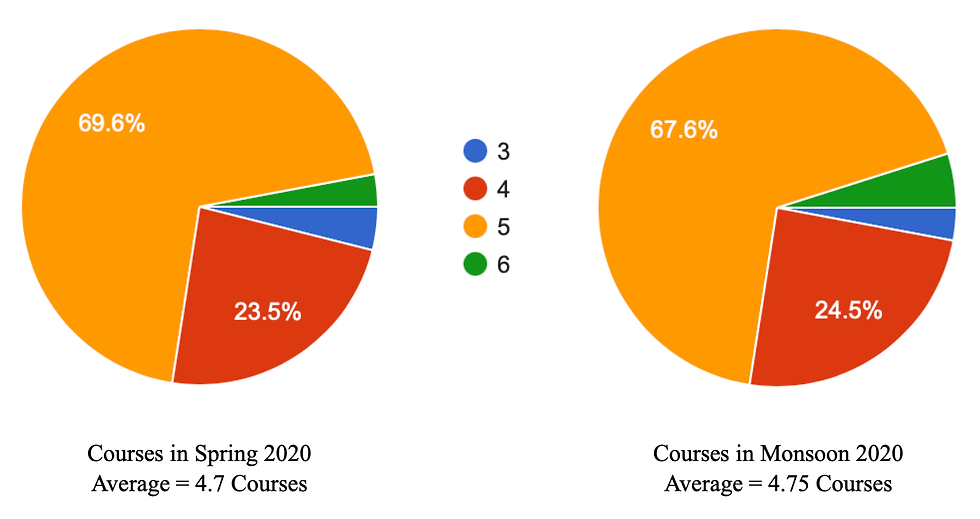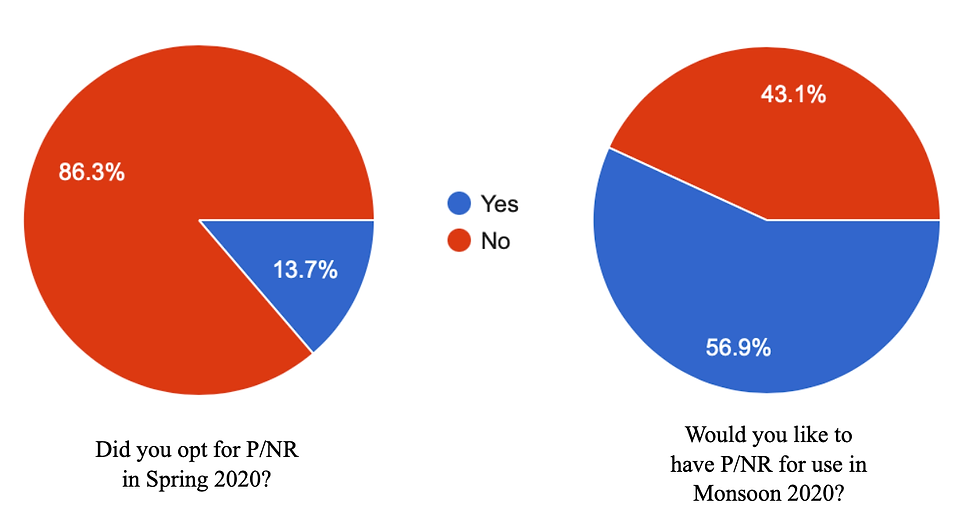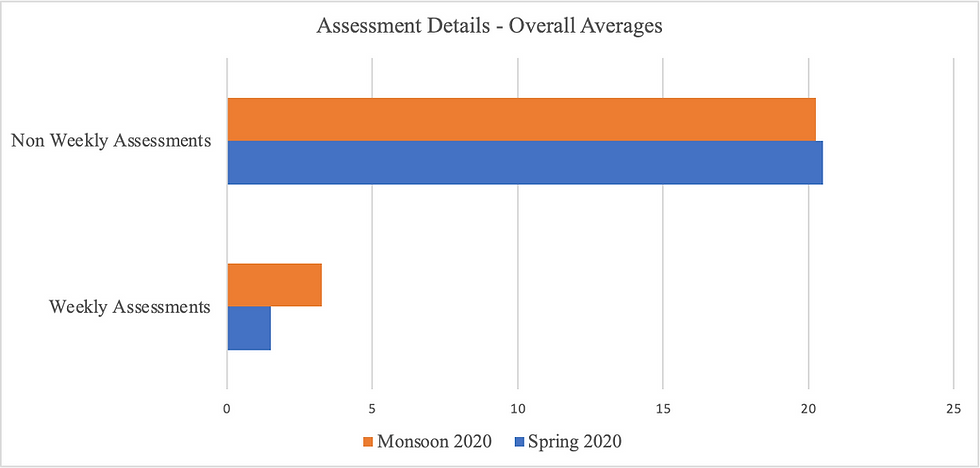A Cloak and Dagger Affair: Analysing the Monsoon 2020 Semester
- The Edict
- Nov 14, 2020
- 5 min read
By Dhrupad Damani, UG21
“Just another cup of coffee and I’ll get this done” – an internal dialogue most of us would have had in the past couple of months. It has become quite clear that stress levels have been going through the roof, with the causes being not just academic, but personal as well. However, as there is an increasing feeling of a rising workload and allegations of professors not taking cognisance of the fact that we are still in a pandemic, is this true?
I remember the three finals weeks I’ve had on campus quite vividly. In the first, I was spending time in the Centre for Entrepreneurship as I was with Vistaar and was promoting their event. In the second, I pulled three all-nighters and celebrated with a trip to Murthal for some aloo parathas. In the third, Samundar Uncle’s SH2 stall came to my rescue with sandwiches, pasta, and Maggi all through the night.
The fourth finals week I faced was quite peculiar. It seemed like an amalgamation of my previous three finals weeks: sitting in a room consuming one cup of coffee after the other, pulling all-nighters thanks to take-home assignments, now stress eating Maggi at home. My fifth semester is almost done, but here I am, wondering whether this whole semester has just been two sets of 7 consecutive finals weeks, with an obligatory one-week break in between.
Up until the Vice Chancellor’s email telling us that we would not be going back to campus in 2020, I still had some hope. Hope not just about being back on campus, but rather that these massive numbers of assessments were just temporary, and that it would all get better the moment we flashed our ID cards at the entry gate. However, that one email was a jolt back into reality that this was going to be a long, long semester.
I surveyed the student body to figure out whether this feeling of having a much greater workload was substantiated by the actual number of assessments in courses across disciplines. It is important to note that although half of Spring 2020 was online, Monsoon 2020 seems to be far more time consuming and stressful as compared to the latter half of Spring 2020, and over 90% of those surveyed agree with this sentiment.
The data showed the following:

All the following calculations in this article have been done based on the above averages.

Non weekly assessments (total) increased from 22 to 24 across Spring and Monsoon 2020.

Average number of courses per student with weekly assessments increased from 1.5 (Covid half of Spring 2020) to 2.5.
The obvious response from our professors at this point would be that “there will be over-reporting of numbers because the students want to show that their workload has increased”. I anticipated this, so I went through the LMS and collected data for all courses for which the assessment pattern was available, for both Spring 2020 and Monsoon 2020. What I found was the following

Non weekly assessments (total) decreased from 19 to 16.5. Average number of courses per student with weekly assessments, however, will be 4 in Monsoon 2020. Data for Spring 2020 (Covid half) was unavailable.
I don’t claim to have complete data for every student and every course offered this semester and the previous one, but I’m quite certain that conducting a survey and looking at syllabi combined should be a good estimate of the number of assessments.
This is where it gets interesting. If we average the number of non-weekly assessments from the survey I conducted and the data available on the LMS, we see the following:

20.5 non weekly assessments to 20.25 in Monsoon 2020 – a negligible change.
1.5 courses with weekly assessments in Spring 2020 and 3.25 in Monsoon 2020 – more than double.
This is just one aspect. Thanks to the Ministry of Academic Affairs’ Academic Accommodation Survey, we get another look at some other aspects of the largely unsustainable nature of academics during the Monsoon 2020 semester. Key findings of their survey include:

Average hours of work put into courses has increased from around 3 Pre-Covid to 5-6 Post-Covid.




Every point above reinforces the idea that Ashoka University’s undergraduate program is neither academically sustainable under current circumstances, nor does it serve the students’ best interests. An attendance policy at a time where students may have more than just academic commitments to deal with? Synchronous exams when students may not be in the same time zone or may have personal emergencies during the time of the exam? The absurdity is endless.
However, this is not to discount the efforts that individual professors have made while designing their courses and making accommodations. Some of these include creating fluid deadlines for assignments, allowing for a more lenient attendance policy, and ensuring that students have enough opportunities to make up their grade.
Majority of the student body believes that the pandemic has hampered their ability to perform academically and that the current forms of evaluation seem to be unsustainable, while the data shows us an increase in hours put in by students and the number of assessments; yet there seem to be no changes made to the way assessments have been conducted and syllabi designed due to force majeure.
However, there seems to be some progress on a global accommodation policy, with the SG and OAA in dialogue regarding a new “Credit/No Credit” policy. Nevertheless, this should not take away from the fact that there has been an increase in workload for students. The opportunities to have lunch with your professors and discuss your course in an informal setting, talking to your classmates after class about the day’s topic after class ends and various other informal channels have been lost due to the pandemic.
Yet, there seems to be no relaxation of academic expectations from professors. At this point, it is common knowledge that each professor picks their letter grade cut off, but also that most stick to the conventional Ashoka cutoff. Maybe it’s time for professors to revisit whether their letter grade cutoffs are an accurate representation of the situation we are in, irrespective of the fact that there may soon be a policy to make a course’s grade not affect your GPA/CGPA.
As the article may seem heavily biased towards the student view, I reached out to the Heads of Departments for comment on the findings of the survey I conducted. Spoiler alert: it might just be what you expected. The unedited department wise responses can be found here.
It is quite disappointing to see that departments decline to comment on the fact that students have expressed distress at the academic requirements of this semester. Some departments even went further to say that we should contact the HoDs and the specific course instructors as well to discuss any problems. However, when a problem is as widespread as this, it isn’t just limited to one department or one instructor, and there needs to be a better-formulated response from the departments and professors as well.
Perhaps the notion of “Ashokan apathy” is not just applicable to students.
featured image : https://www.dailycardinal.com/article/2019/09/beat-the-college-slog
About the author –
Dhrupad is a third year economics and finance major. His interests include all things football, and will debate you on why Gangs of Wasseypur is the best thing to come out of Bollywood.




Comments